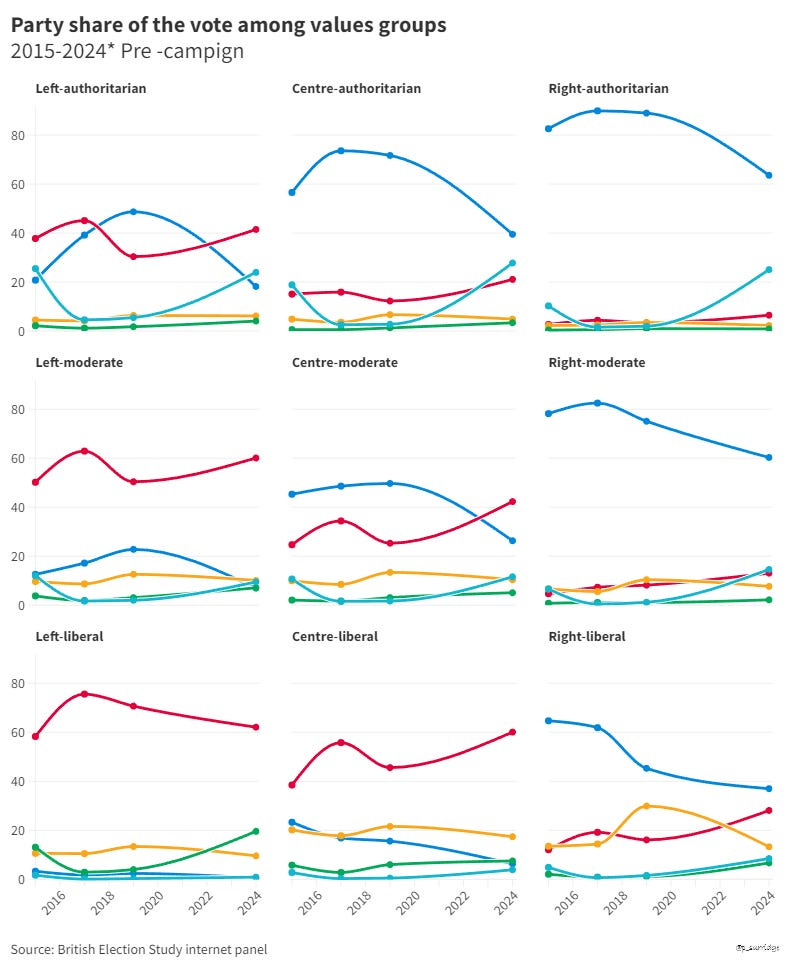Map Men on gerrymandering
Map men have a video on Gerrymandering:
A new town designed by King Charles
Some time ago, I posted an idea to build a new town with high density housing, similar to Edinburgh, and with significant input on the architecture by king Charles.
I recently found out that Ed West had the same idea. Let us call him 'King Charles the Builder':
Nothing would better suit the new King’s role than to build a new generation of towns and suburbs, and provide much needed housing for his young subjects. King Charles has a very limited role within the constitution, but his potential legacy is enormous if he wants it — beautiful towns and cities to last the years, living streets that in centuries to come people will want to gaze at and talk about. We need a dozen more Poundburys, a hundred more Nansledans. Build them, Your Majesty! Build them.
AfD foreign policy
Deutsche Welle looks at what the AfD's foreign policy would be:
To summarise, they want:
less US influence in Europe, and no US soldiers in Germany
a more militarily powerful Germany, but without nuclear weapons
a new security architecture to replace NATO and the EU, but are vague about the details
good relations with China, and don't care if China invades Taiwan
Germany to join the China-led Shanghai Cooperation Organisation and Russia-led Eurasian Economic Union, as observers
They believe the EU cannot be reformed, and want it to be replaced by a federation of nation-states.
George Barnes praises FPTP
Over at Conservative Home, George Barnes has written a bizarre and factually inaccurate article praising FPTP:
Although it has its downsides (just like every other alternative), I do not doubt that FPTP is of greater benefit to the UK than Proportional Representation (PR), its closest rival.
Wrong. PR isn't a system. It's a characteristic of which voting systems can have more or less of.
PR would sever elected officials from a geographical area
Wrong. There are plenty of proportional systems that retain a constituency link, such as the AMS system used to elect the Scottish parliament, or the STV system used to elect Scottish councils.
The cold reality of our political landscape makes it practically impossible for a political party to obtain the majority required under PR to enact serious reforms.
That's a feature, not a bug. If they want the majority of MPs they should need to get a majority the votes (or close to it).
Under FPTP, our country will always maintain the ability to elect a decisive and strong government when it needs it the most.
LOL. Under FPTP we had 3 Prime Ministers in 2 months in 2022.
Under FPTP, our country will always maintain the ability to elect a decisive and strong government when it needs it the most. With the UK facing myriad challenges in the coming decades, both domestically and internationally, this is a benefit we must hold on to.
When a serious threat presents itself, FPTP will allow us to make the bold changes necessary to adapt and overcome it. Countries under PR will not be so fortunate.
Here we get to the nub of Barnes' argument. he argues that FPTP provides strong decisive government that will be especially good in a crisis.
Well, we're in a crisis at the moment, the Russian invasion of Ukraine. So let's look at how Poland, Finland and Sweden (all with parliaments elected by proportional systems) fared compared to Britain.
All four countries have military equipment they could spare to Ukraine. Finland and Sweden made a break with their long-held policies of neutrality and joined NATO, and increased defence spending. Poland started a massive re-armament programme, increasing defence spending to 4.5% of GDP. britain also announced an increase in defence spending, to 2.5% of GDP -- at some unspecified future date towards the end of the decade.
I would also point out that Finland, with a 1/12th the UK's population GDP and defence spending, has an army as big as Britain's, so pro rata to their population they had more spare kit give Ukraine.
This demonstrates that Britain (whether because of FPTP or for other reasons) is not in fact better in a crisis than other countries.
Bentham's Bulldog on feminism
Bentham's Bulldog describes two dogmas of feminism
(1) Extreme confidence that women are treated worse than men
Nearly all feminists seem to be extremely confident that in the United States and most other Western countries, women are treated much worse than men. They find this to be so obvious that they rarely see the need to explicitly defend it, often growing quite incredulous when people deny it. When asked to defend it, they generally simply rattle off a laundry list of ways that women are treated badly.
(2) Only caring about harms to women
As the last section showed, men are treated quite badly in lots of ways. While various problems primarily afflict women, others primarily afflict men. Yet the second common error among feminists is focusing exclusively on the problems that afflict women.
As Tierney has noted, feminists spend a great deal of time getting outraged about the paucity of women in STEM. Yet they’re completely indifferent to the fact that in nearly all fields, there are more women than men (this is an inevitable consequence of college being roughly 60% women). No one is outraged that psychology is mostly women, or that the same is true of sociology, gender studies, and nearly every other field. Yet when fields are as male-dominated as the average field is female-dominated, that’s a cause for alarm.
Feminism, like all political ideologies, to some extent is a backscratchers club, dedicated to helping the ingroup at the expense of everyone else.
US Navy cocks up building Constellation Frigates
After their massive failures building the Zumwalt-class destroyers, and Litoral Combat Ships, the US Navy has now failed at building the Constellation-class Frigates:
Apparently if you sack all the people who know how to design ships, and keep changing the specifications while in the middle of building them, it leads to delays and cost over-runs. No-one could ever have predicted that.
Chaos is a ladder
What do jihadists, communists and far-right accelerationists have in common? They all think chaos is a ladder, according to the reviewer of Nine Lives:
It’s easy to notice how eerily similar the jihadists’ thinking is to communist and far-right accelerationism. The eventual victory of our ideology is inevitable, either because of divine prophecy, or some “arc of history”. But in the current world order, we are severely overpowered, and there is no clear way how we could win. So we make things worse for everyone until everything breaks down, and our ideology will inevitably emerge victoriously from the chaos. What could go wrong?
It’s kind of surprising that so many different ideologies converged on this counter-intuitive strategy that didn’t really work for any of them. I suspect that part of the answer is that accelerationism is just a general purpose ideology of Evil. If you have a group of violent people, who enjoy cruelty, killing and destruction, but still want to believe themselves to be the good guys, what kind of ideology do you give them? “Bad things are good, because they bring forward the glorious BLANK. So do your thing.” The content of BLANK doesn’t really matter, only that you can accelerate towards it by being evil.
Defending Starmer on prison early releases
On X/Twitter I defended Starmer on early prison releases:
Readers of this blog will be aware I'm not a fan of Starmer. But I do try to be fair to him (and everyone else) nevertheless.
Why UK can't grow
Noah Smith looks at why the UK economy can't grow:
Per capita electricity generation in the UK is just two thirds of what it is in France. Tram projects in Britain are two and a half times more expensive than French projects on a per mile basis. Britain has not built a new reservoir since 1992. Despite huge and rising demand, Heathrow annual flight numbers have been almost completely flat since 2000. The planning documentation for the Lower Thames Crossing, a proposed tunnel under the Thames [cost] more than twice as much as it cost in Norway to actually build the longest road tunnel in the world…
Southwood et al. then go on to detail many of the ways in which the UK’s legal and institutional framework prevents housing, infrastructure, and energy from being built. Many American readers will recognize a lot of the same problems that plague our own country — NIMBYism, cumbersome environmental review procedures, low state capacity, outsourcing to consultants, and so on. The Anglosphere countries share many of the same dysfunctions. But the UK also has various other problems that the U.S. generally doesn’t have, such as hard government limits on urban sprawl combined with height restrictions that prevent density. America and Britain both make growth very hard; Britain often simply forbids it.
This all needs to be fixed, and ending nimbyism would be a good start.
Analysis of the UK electorate
Paula Surridge has an interesting analysis of the UK electorate.
Here's people's value on economic issues (x-axis) and social issues (y-axis):
And here's how each of these 9 groups voted in the last 4 general elections:
Gender fluid dog row: lesbian social worker get £63k payout
Via Helen Dale, this:
This story highlights how when wokists talk about "inclusion", what they really mean is "exclusion of people critical of wokism".







